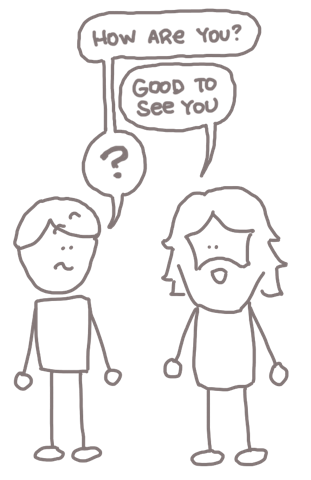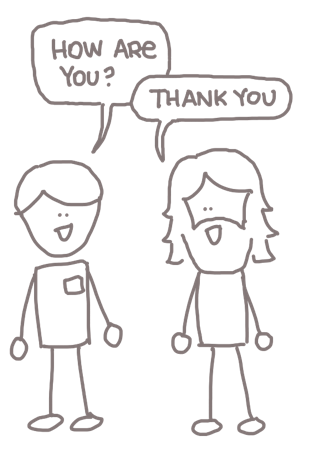
There are enough times when “How are you?” comes from someone for whom “Good to see you” is not the correct response to merit further consideration.
A couple weeks ago, I shared my thoughts on the common greeting, How are you? In that article, I expressed my displeasure with this question, particularly as someone who struggles with mental health. My reply of choice was to sidestep the question and neither answer truthfully nor lie, and simply state, “Good to see you.”
Since that time, I have noticed a number of occasions when even this is not appropriate. One of the most common of these situations for me has occurred while shopping. Since I have been on a healing retreat the past couple weeks, I have not interacted with friends and colleagues as often. I have been surprised at how often I am still confronted with this personal question from complete strangers.
When I do not know the person at all, responding with, “Good to see you” is not appropriate. Partly it sounds weird, but mostly it simply is not true. Most of the time, I would be much happier if I could shop efficiently and effectively without speaking with anyone.

So I have taken a new approach in these situations. When someone greets me, “How are you?” I simply respond, “Thank you.” Often it’s followed with a question that I actually have, such as the location of a specific item.
I have found some interesting reactions to my “thank you” response. Most of the time, people just continue on without missing a beat. We have merely exchanged polite niceties and can now continue with our information transaction. Occasionally, an observant person will be a bit taken aback that I have not answered the question. And my favorite has been a response back of, “Fine, thanks.” There is an assumption that not only did I answer the question, but I asked a similar one in return.
This new approach of mine has done a couple things for me.
First, it has reminded me of how little people actually listen. This is hard for me to stomach, and is part of the reason I had to come up with an alternative response in the first place. What I say impacts me much more than most people with whom I interact.
Second, this has resolved a further point of distress. It has enabled me to move more gracefully through social interactions that might otherwise be awkward or painful.
This may or may not be the right approach for you to take. I encourage you to explore your responses to common situations and evaluate whether any change is needed. Most importantly, I urge you to consider no longer throwing away personal questions as greetings. Save them for the people who matter the most to you, and then care enough to get a real answer.